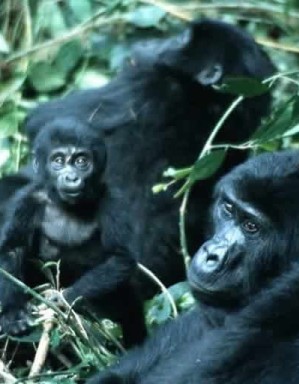|
Central Africa | East Africa Society | Environment - Nature Central African gorillas towards extinction
The pessimistic outlook is presented today in a report by the UN's environment agency UNEP and the international police organisation INTERPOL. Together, they have mapped the habitats of the great apes and the illegal trade in timber and minerals in Central Africa. This illegal trade is key to understand the great habitat loss of gorillas.
According to INTERPOL's David Higgins, "the gorillas are yet another victim of the contempt shown by organised criminal gangs for national and international laws aimed at defending wildlife. The law enforcement response must be internationally coordinated, strong and united, and INTERPOL is uniquely placed to facilitate this." Christian Nellemann, a senior UNEP officer who was lead author of the 2002 report, was surprised to learn about the new speed of destruction of gorilla habitats in Central Africa. "With the current and accelerated rate of poaching for bushmeat and habitat loss, the gorillas of the Greater Congo Basin may now disappear from most of their present range within ten to fifteen years," said Mr Nellemann. "We are observing a decline in wildlife across many parts of the region, and also side-effects on poaching outside the region and on poaching for ivory and rhino horn, often involving poachers and smugglers operating from the Congo Basin, Uganda, Burundi and Rwanda, to buyers in Asia and beyond," he added. The report does, however, contain some positive news. A new and as yet unpublished survey in one area of the eastern DRC, in the centre of the conflict zone, has discovered 750 critically endangered Eastern lowland gorillas. The other good news is that the mountain gorillas in the Virungas, an area which is shared by Rwanda, Uganda and DR Congo, have survived during several periods of instability. This was said to be the result of trans-boundary collaboration among the three countries, including better law enforcement and benefit sharing with the local communities. But it was also due to the efforts of courageous Virunga park rangers, of which 190 were killed in recent years in the line of duty. By staff writer © afrol News - Create an e-mail alert for Central Africa news - Create an e-mail alert for East Africa news - Create an e-mail alert for Society news - Create an e-mail alert for Environment - Nature news
On the Afrol News front page now
|
front page
| news
| countries
| archive
| currencies
| news alerts login
| about afrol News
| contact
| advertise
| español
©
afrol News.
Reproducing or buying afrol News' articles.
You can contact us at mail@afrol.com









